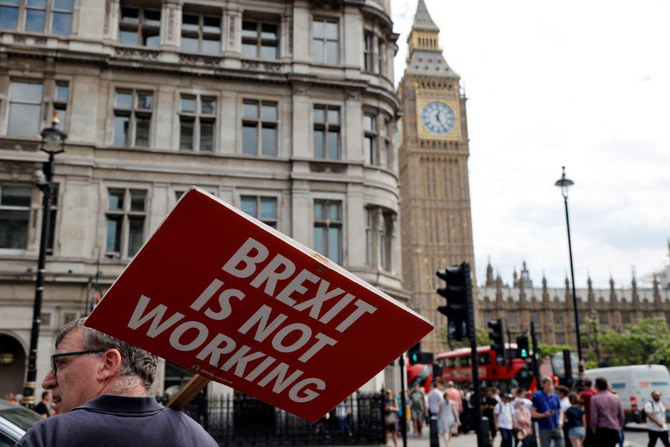
In recent years, it has become less unusual for people to celebrate the divorce of unfortunate couples in the same way weddings are celebrated. I could never imagine asking anyone to commemorate or join me in reliving the pain of my divorce, where everything was simply divided in half, emotionally, materially and practically, including even the friendships that the union had nurtured and was blessed with.
Likewise, last week’s celebration of the seventh anniversary of the UK’s referendum on leaving the EU — which was held on June 23, 2016, and led to Brexit, aka the divorce of the century — was absurd. Brexit remains a failing endeavor and constitutes a double whammy of losses for Britain, its economy, and its people and their relationships with friends and family across the water in mainland Europe. It has made travel more difficult, including for leisure visits, commercial interactions and research and educational exchanges, but above all it has created a deficiency of trust, increased suspicions and inspired a general feeling of doubt. These drive misunderstandings and erase the common sense of purpose between the people of Britain and the EU. Despite the slogans, the destiny of “Brexit Britain” is to be part of the EU family.
In the pre-referendum days, the UK was warned that the hits it would take to its economy as a result of Brexit would far outweigh the benefits. The Leave campaign repeated empty slogans about building a better National Health Service, a better-rewarded labor market and an economy capable of reaching new heights of prosperity after unshackling itself from the so-called common market controls and customs union red tape, resulting in a so-called Singapore-on-Thames.
Experts and public entities were marginalized and their professional reports detailing how Brexit would make Britain poorer, less competitive and more isolated economically in a world so interconnected after decades of globalization were discredited by the Brexiters’ misinformation campaigns, which labeled them a scare-mongering effort to subdue the nation and abort its leap to regain its sovereignty.
Above all, leaving the EU was a promise to stem the flow of migrants — an issue that mainly galvanized Middle England’s older voters in favor of leaving, as they were led to believe that European freedom of movement threatened to change the composition and color of the British nation.
And here we are, seven years later, with the divorce repeatedly visiting the court of history to study the fallout and try to apportion blame. There have been many failed attempts to agree on a unified narrative that could help the nation rise again. Yes, maybe it is not only the Brexit divorce that is to blame for the rampant inflation that is threatening to push the UK into a longer-lasting recession than its fellow advanced nations of the G7 and G20 groups. One could blame the Bank of England’s economic policies, post-pandemic disruptions or Vladimir Putin’s war in Ukraine, all of which have played a part in the UK’s current predicament and poor performance.
The UK was warned that the hits it would take to its economy as a result of Brexit would far outweigh the benefits.
Mohamed Chebaro
However, unfashionable as it may be to say so, Brexit is a key factor in the country’s unique misfortune. It has pushed Catherine Mann, a distinguished economist, to calculate that prices are 4 percent higher due to Brexit than they would be otherwise, as “no other country chose to unilaterally impose trade barriers on its closest trading partners.”
A YouGov poll taken last month showed that 56 percent of those asked said that the UK was wrong to leave the EU, against 31 percent who said it was the right decision, while 62 percent said that Brexit has been “more of a failure.” In another poll by Opinium, which offered four options for the future UK-EU relationship, 36 percent of respondents chose “we should rejoin the EU” and another 25 percent chose “we should remain outside, but must negotiate a closer relationship with them than we have now.”
While some rush to celebrate the nonexistent opportunities of Brexit seven years on and others are still in mourning for having left, the UK, like those who go through the more traditional divorce, finds itself in limbo. There have been four prime ministers since 2019, with the political system drifting in and out of crisis due to a lack of a common vision that would offer a bit more certainty and promote growth. Instead, the supply chains to and from the EU have been disrupted, adding delays and costs.
Above all, for an economy to grow, certainty is a key commodity and its absence — like the absence of the old regime’s easily flowing skilled laborers, who have been replaced by an arbitrary and highly politicized points-based immigration system — has denied the UK market its hard-earned agility that, once upon a time, made it the envy of Europe and the world.
What a divorce decision taken by one half of a couple usually fails to factor in is the cost of the loss of face and the sense of pity and despair among the common friends of both parties, which once held them in high esteem and treated them with the utmost respect. The post-Brexit UK’s internal discord and divisions have conspired to leave the country wounded, as well as the subject of pure bafflement and even some ridicule. This is especially so given the half-hearted indications from some UK political establishment figures of the grave historical error of Brexit and the need to try and renegotiate what amounts to a new half-marriage — not in and not totally out — exactly in tune with the right-wing ideological arguments of having the cake and eating it too.
• Mohamed Chebaro is a British-Lebanese journalist, media consultant and trainer with more than 25 years of experience covering war, terrorism, defense, current affairs and diplomacy.












